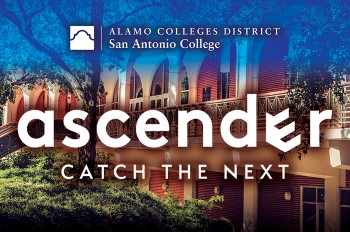Ascender Program helps first-year students thrive at SAC
August 11, 2021
The first year of college can be overwhelming, especially for first generation college students.
The Ascender Program at San Antonio College is designed with that in mind, providing an academic and social support network to help students successfully launch their college careers.
Ascender offers resources including one-on-one advising and counseling, courses taught by specially trained instructors and a close-knit community of students with similar backgrounds.
 As a first-generation college student, a first generation American and a community college graduate, program director Dr. Joan Jaimes, Director of Teaching and Learning at SAC, understands how the right support makes a difference when starting college.
As a first-generation college student, a first generation American and a community college graduate, program director Dr. Joan Jaimes, Director of Teaching and Learning at SAC, understands how the right support makes a difference when starting college.
“My parents always supported my path to education, but never really had the tools to provide guidance,” she said. “This is what Ascender does for students. They become part of a learning community. Ascender connects them with the support and resources they need to continue their success in academia, career and life.”
Ascender is part of Catch the Next, an organization focused on improving college readiness and completion among Latinos and other underserved communities.
AN ACADEMIC FAMILIA
At the heart of SAC’s Ascender program is a group of faculty members and advisors that have completed special training to provide multiple levels of support to first-generation college students. Faculty members participate in a year-long program to learn how to work with traditionally underserved students and keep them engaged in academics.
Two dozen faculty members from SAC’s English, math, philosophy, psychology, government and education departments have taken the training, learning not just how to teach Ascender students more effectively, but also how to serve as a resource and mentor to them.
Ascender professors collaborate to provide a coordinated approach to their classes. For example, students get assignments in one class that relate to what they’re learning in another class. Professors also coordinate workloads so students aren’t tackling multiple big projects at one time.
This core group of faculty, along with the students themselves, form an “academic familia” that provides support in many forms.
For Brittany Paez, mentoring from an Ascender professor helped her finish a tough year. She started at SAC in 2020, a decade after her high school graduation. Inspired by volunteering at her children’s school, Paez decided to become a teacher.
But in her second semester at SAC, she struggled with participating in college classes online with three kids at home due to the pandemic. She reached her limit when a snowstorm left her without power for more than 4 days. She considered giving up.
Sociology professor Terri Slonaker provided Paez with the encouragement and support she needed to keep going. In addition, during the winter storm, Slonaker reached out to students to ask what they needed, offering assistance and providing links to resources, including food and shelter.
“She said ‘I’m here to teach you, but I’m also here for your mental well-being. If you have questions, if you feel overwhelmed, I’m going to stay on the Zoom after class, I’m here for you,’” Paez said. Paez not only persevered, but also made the Dean’s List for spring semester.
Other Ascender professors also provided an extra measure of understanding and care.
“They were amazing. They were very understanding and patient and they were very available when I needed them,” Paez said.
STRENGTH IN NUMBERS
The feeling of belonging is reinforced by academic cohorts, a feature of the program that keeps Ascender students together in core classes to strengthen bonds and provide another layer of support.
“The most helpful thing was staying in groups,” said Araceli Torres, a first-year student studying human resource management. “You knew the same people, it was easy to keep in touch if you had to miss a class, and you were able to rely on those other people because we were so close.”
That sense of community was “comforting, inspiring and motivating” to Sophia Farias, an English major who completed her first year at SAC in the spring. She forged a lasting connection with classmates despite meeting only online.
“I still connected with people who were on the same path as me,” Farias said. “There’s a definite sense of community.”
All of these factors combine to create better outcomes for students. Ascender students are more likely to graduate with associate degrees and to successfully complete bachelor’s degrees than their peers statewide.
Students are invited to participate in the program based upon college entrance test scores or their status as a first-generation college student.
If the invitation comes, take it, advises Paez.
“It’s amazing. Especially if it’s your first year, they are there for you 100 percent,” she said.
–SAC–
